When We Were Kings
More than twenty-five years after its long-awaited release, the Academy Award-winning When We Were Kings remains one of the finest boxing documentaries ever made. The film chronicles a most historic heavyweight duel, the 1974 clash between Muhammad Ali and George Foreman in Kinshasa, Zaire, in which “The Greatest” regained the world title. Bolstered by compelling interviews, the film introduces us to a plethora of memorable characters who highlight the cultural importance of “The Rumble in the Jungle,” though the actual fight is never an afterthought, and Ali’s beautifully orchestrated eighth round knockout of Foreman provides a moving climax to a slick film. It is a decidedly glowing remembrance of the force Muhammad Ali once was, but this subjectivity aside, When We Were Kings is magnificent documentary art.

The film provides the historical context of Ali vs Foreman through footage of the violence which accompanied the transition of the Belgian Congo to the newly named ‘Zaire’ and the rise of Mobutu Sese Seko, the dictator who helped bring Ali vs Foreman to Kinshasa by promising each fighter five million dollars. Racial politics permeated the event and were seized upon by Ali. The Muslim challenger, who had been stripped of his world title after he refused to be drafted into the Vietnam War, positions himself as the true African in contrast to the presumably more Americanized Foreman, while George does himself no favors by attending his first press conference in Zaire accompanied by a German Sheppard, the same breed of dog which the Belgians had used to subdue the Congolese. In addition to the big fight, a music festival featuring stars such as James Brown and B.B. King took place, adding further cultural weight to a spectacle that, as Ali states with characteristic grandiosity, “is the first assembly of the American black man in Africa in the history of the world.”
Ali, unsurprisingly, emerges as the film’s star. No doubt we get a sanitized version of ‘The Greatest” in When We Were Kings, bordering at times on hagiography, his charisma and clever word play contrasting sharply with the dour Foreman, whose intimidating reticence is underscored by scenes from his violent demolition of Joe Frazier. A clear favorite leading up to the fight, the champion’s punching power was undeniably awesome, and there’s a memorable scene in which he pounds a heavy bag so hard he creates a turkey-sized dent in it.
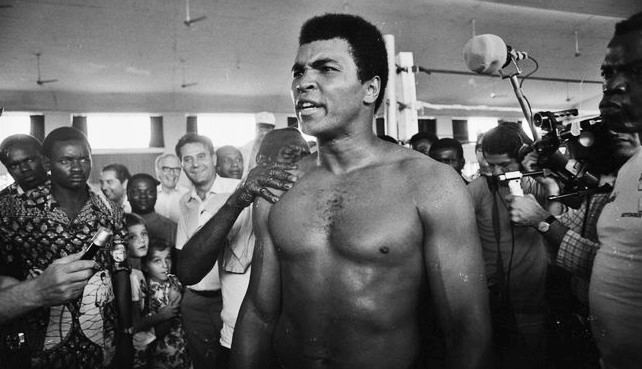
Ali’s training sessions, conversely, are equally intense but more lighthearted; he spars with a young Larry Holmes and then rhymes and preens for his audiences, promising to destroy Foreman, whose allegedly stiff fighting style Ali likens to a mummy. Once in Africa, he quickly endears himself to the local populace who create their own chant for him, “Ali Bomaye!“, meaning “Ali Kill Him!” Interestingly, Foreman expresses displeasure with the phrase, ostensibly because of its violent message. This is probably the most poignant personal insight we receive of George in the entire documentary.
Also fascinating are the scenes with a newly emergent Don King. A verbal wizard who alternatively quotes Shakespeare and speaks, with probable insincerity, of his desire to use the fight’s proceeds for philanthropy, King shows off the charisma and cunning that would enable him to conquer the chaotic world of boxing promotion. Ali biographer Thomas Hauser says that while he has met few smarter or harder working people, King is “totally amoral, and I can’t think of a man who’s done more to demoralize fighters, exploit fighters, and ruin fighter’s careers than Don King. But you have to give him his due for what he did to make Muhammad Ali versus George Foreman in Zaire.”
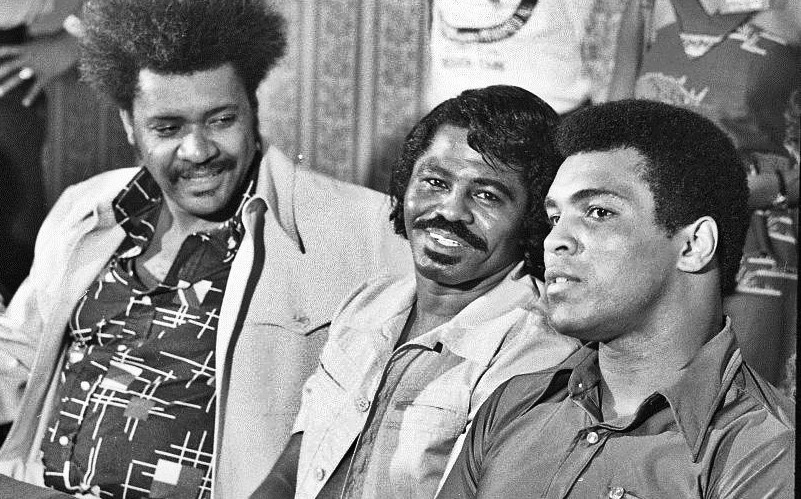
The fight itself, delayed by weeks because of a cut Foreman sustained in training, was held in a huge, open air stadium very late in the night to accommodate the American closed-circuit television audience. Prior to the bout, Ali’s dressing room was likened to a morgue because of the pervasive feeling amongst his handlers that he was about to receive a beating. The Greatest, of course, thought otherwise, and he bravely trades power punches with Foreman in the opening round.
It is in the dramatic transition between the first and second rounds when the film seeks to encapsulate Ali’s greatness. We see him standing in his corner, staring across the ring at the man who, as Mailer bombastically puts it, “was stronger than him, who was not afraid of him…[and] who was determined and unstoppable.” Ali’s facial expression is one of unmistakable concern, as though grimly contemplating the fact that if he is to win, he must call upon reserves of strength and skill he’s never tapped before.
And call upon them he does. Ali masterfully outwits and outfights the dangerous Foreman, neutralizing the champion’s vaunted power to land his own precise shots. The Texan’s reckoning comes in round eight, with Ali suddenly coming off the ropes to hammer Foreman with a series of blows and a final right hand to the jaw that sends the champion tumbling to the floor. Stunned and completely worn out, Foreman is finished. The crowd goes into a frenzy as the referee counts George out and a triumphant Ali, once again the king, raises his hands before being mobbed by his corner.
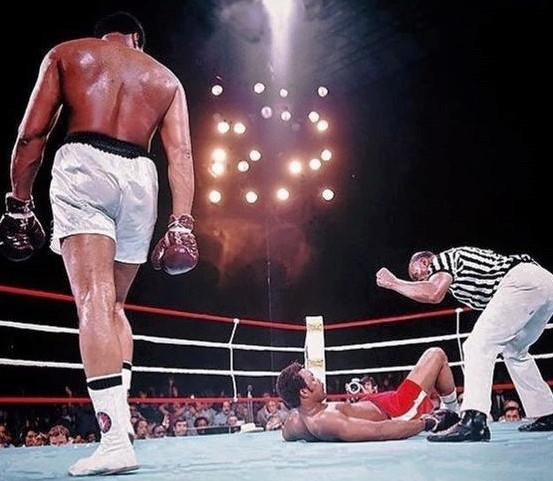
What resonates most in Gast’s presentation of the fight is the indomitable will and superior intellect of the more experienced Ali. Facing the greatest physical threat of his career, he operates with the strategic acumen of a chess master. Whether it is his finest career victory is a matter of debate, but its narration in When We Were Kings is stylistically brilliant and the film serves, particularly for a younger audience, as an important testament to the audacious and extraordinarily charismatic person Ali was before his voice was taken from us by Parkinson’s Syndrome. The film is not objective in its representation of Ali, but it’s as sharp and graceful as the style “The Greatest” employed to defeat George Foreman. And an enthralling watch more than 25 years later. –Eliott McCormick

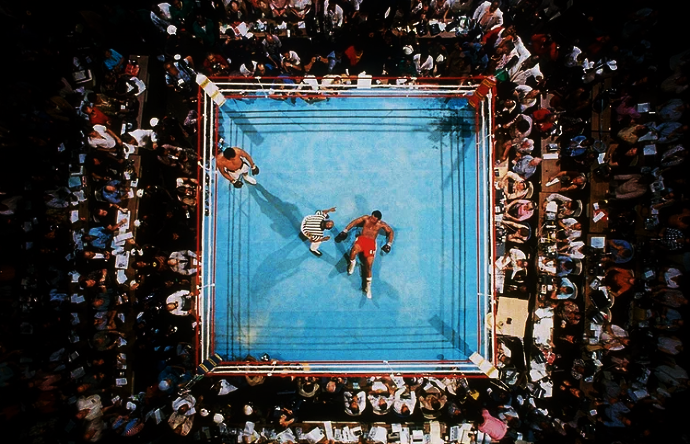
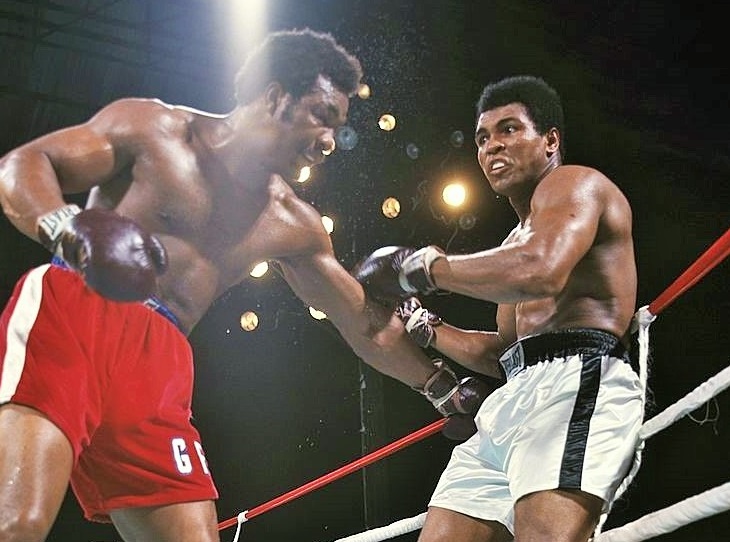

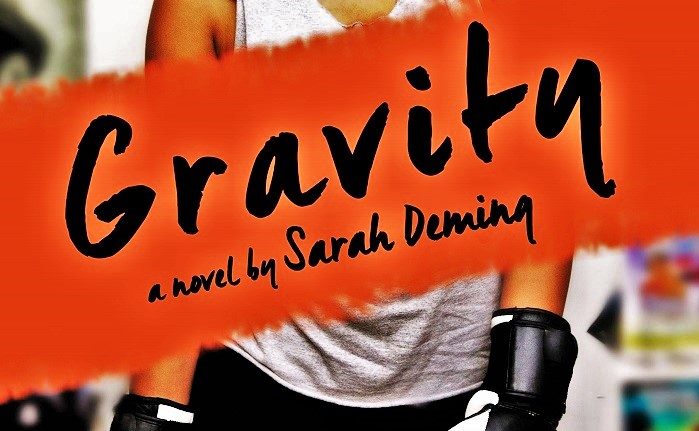
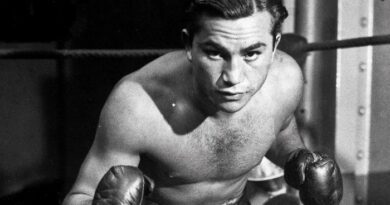
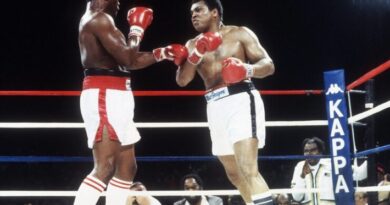
Good stuff!!